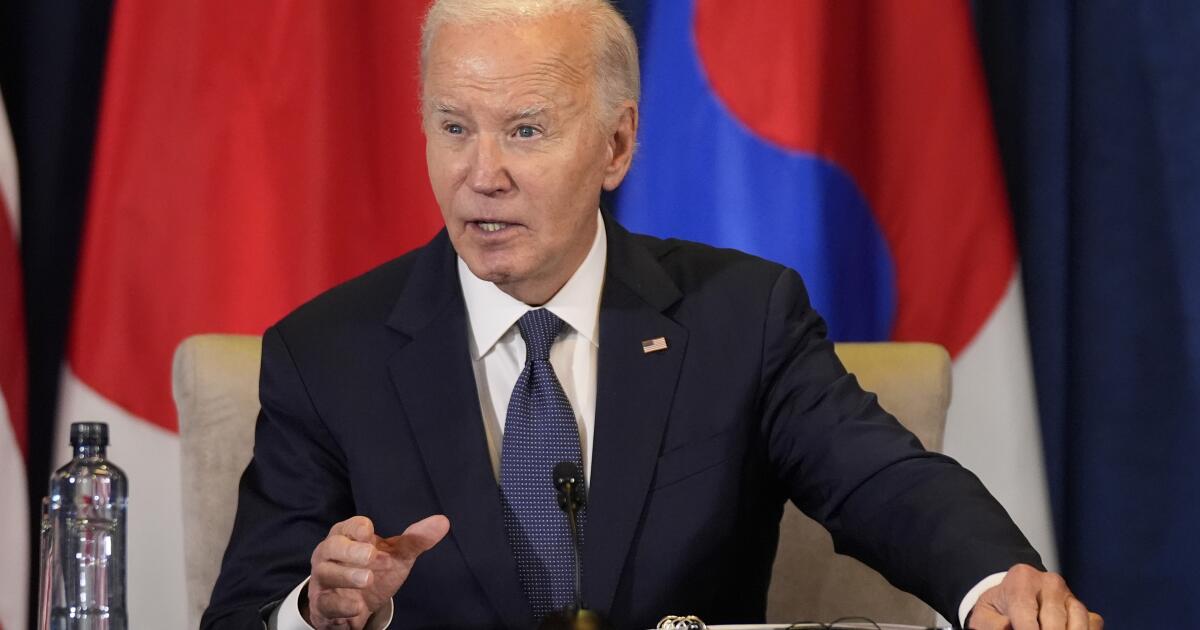LIMA, Peru — President Biden on Friday praised the cooperation among South Korea, Japan and the U.S. in countering what he described as North Korea’s “dangerous and destabilizing cooperation with Russia.”
Biden spoke at the start of a meeting in Peru with South Korean President Yoon Suk-yeol and Japanese Prime Minister Shigeru Ishiba on the sidelines of the Asia-Pacific Economic Cooperation summit. The talks came amid heightened concerns about North Korea’s growing military partnership with Russia and Pyongyang’s stepped-up ballistic missile tests.
Biden celebrated the partnership between Japan and South Korea, two countries that have historical enmity but under Biden’s presidency are tightening security and economic ties as their corner of the world becomes more complicated.
Biden noted that it would be his last meeting with them but that the trilateral partnership should be preserved for years to come.
“I’m proud of how far we’ve come,” Biden said. “Whatever the issue, we’ve taken it on together.”
The meeting came as North Korea has deployed thousands of troops to Russia to help Moscow try to claw back land in the Kursk border region that Ukraine seized this year.
“As we can see from the recent deployment of DPRK troops to Russia, the challenging security environment within and outside the region once again reminds us the importance of our trilateral cooperation,” Yoon said, using the initials for North Korea’s formal name and speaking through a translator.
Ishiba also emphasized the importance of the three nations acting as a bulwark against North Korea and pointed to recent military exercises between the three nations as a sign of cooperation.
A three-day exercise in June was geared toward improving joint ballistic missile defense, anti-submarine warfare, surveillance and other skills and capabilities and to help the three countries improve their ability to share missile warnings — increasingly important as North Korea tests ever-more sophisticated systems.
“I look forward to furthering our partnership in response against North Korea and in many other areas,” Ishiba said through a translator.
North Korean leader Kim Jong Un ordered a series of ballistic missile tests in the lead-up to this month’s U.S. election and is claiming progress on efforts to build capability to strike the U.S. mainland. White House officials are concerned that Pyongyang could be dialed up for more provocative action ahead of President-elect Donald Trump’s inauguration and the early days of his administration.
“I do not think we can count on a period of quiet with the DPRK,” said White House national security advisor Jake Sullivan. “The possibility of a seventh nuclear test remains ever present and something we’re vigilant for. The transitions have historically been time periods when the DPRK has taken provocative actions both before and after the transition from one president to a new president.”
Biden is on a six-day visit to Latin America for the final major international summits of his presidency, following up APEC with a gathering in Brazil of leaders from the Group of 20 top economies. He’s likely to face questions from world leaders about the incoming administration as they turn their attention to what Trump’s return to the White House will mean for them.
Biden took part in an informal meeting with other APEC leaders Friday, walking in as Peru President Dina Boluarte was delivering her welcoming remarks. Biden, who is also meeting later Friday with Boluarte, shook hands with leaders from Thailand and Vietnam.
The growing North Korea-Russia relationship was top of mind at the three-country meeting.
Up to 12,000 North Korean troops have been sent to Russia, according to U.S., South Korean and Ukrainian assessments. U.S. and South Korean intelligence officials say North Korea also has provided Russia with significant amounts of munitions.
The trilateral talks are a follow-up on a partnership launched at a historic 2023 meeting between Biden, Yoon and Kishida at the U.S. presidential retreat at Camp David, Md.
Biden nudged Japan and South Korea to put aside years of historical animosity and strengthen economic and security ties as the countries confront the threat from North Korea as well as increasing military assertiveness by China in the Pacific.
The three countries signed a pledge to consult, share information and align their messaging with one another in the face of a threat or crisis.
Sullivan said the Biden administration is working to ensure the three-country cooperation is “an enduring feature of American policy.” He expects it would continue under Trump, noting its bipartisan support, but acknowledged it was up to the incoming president’s team.
Yoon and Ishiba already have reached out to Trump and are aiming to keep their countries’ relationships with the incoming administration on steady footing amid the heightened tensions.
Madhani writes for the Associated Press. AP writer Rebecca Santana in Washington contributed to this report.
Source: www.latimes.com


